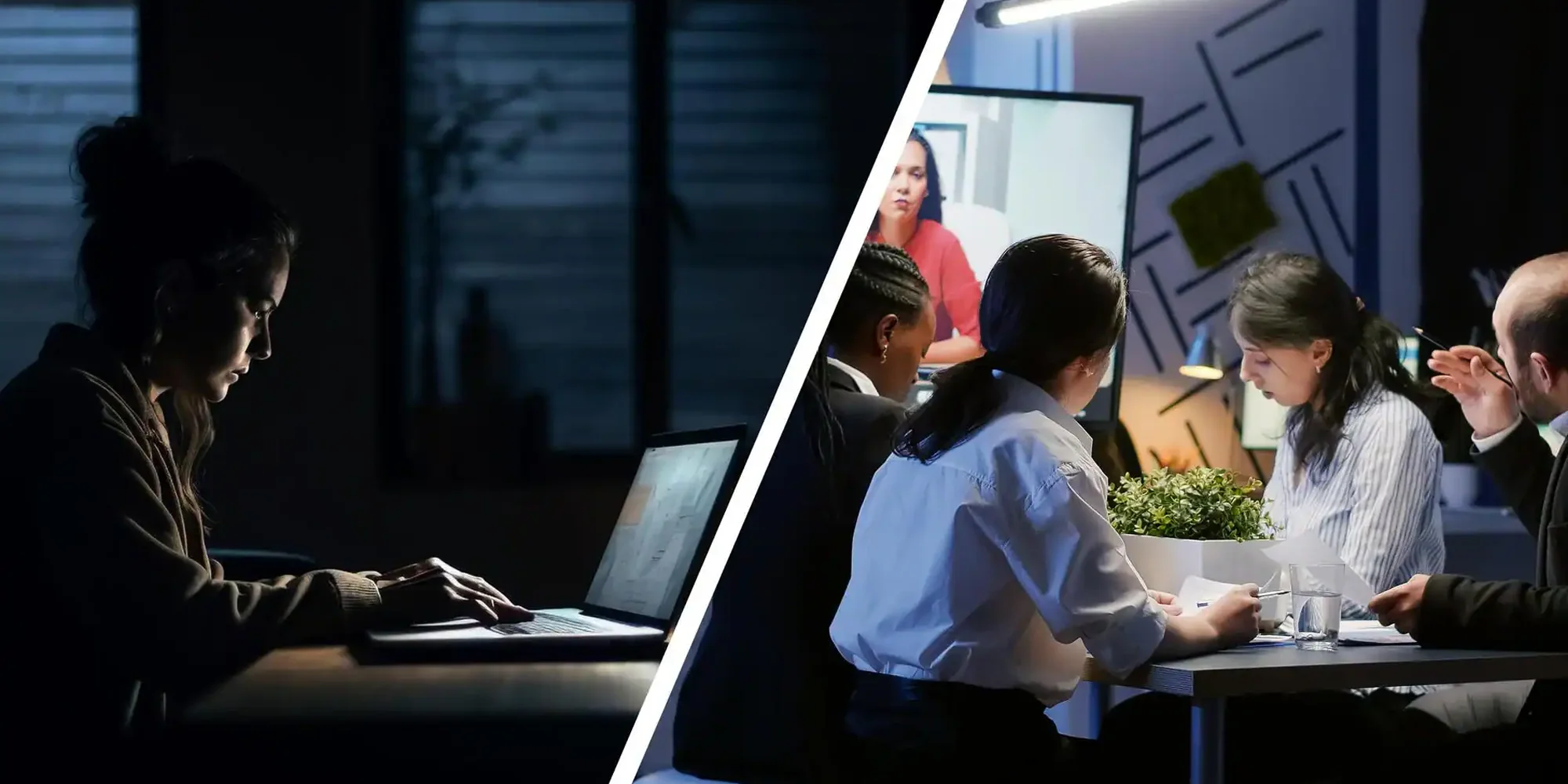
In this article
Must-Read Survey | Work from Home(WFH) Or Work from Office(WFO)?
In this article
Introduction
We have featured 10+ thoughts – Work From Home or Work From Office?
These are the questions we asked to Founder and CEO, Chief Editor, Co-Founder, VP Marketing, B2B Writer, Director of IT, Contributing Writer, Keynote, and TEDx speaker, Award-Winning Author
Questions:
1. Please Rate Out of 10 Work From Home OR Work From Office
2. Top 5 Unique Reasons for High-Rated Option
3. How is/was your Experience with WFH in terms of Work Productivity and ROI?
4. What will the best FUTURE TREND (Work From Home OR Work From Office) for Your Company’s Employee
5. Do you love to manage everything remotely?
WFO and WFH: Expert Opinions on Which is Better
1. Anil Menghani :
Co-Founder | 20+ years Experience | Partnership, APAC | #60SecGuy 
Work From Home – 9, Work From Office – 6
- Good mix of work & play
- Fewer distractions and more focus
- Used commute time for Netflix
- Developed up a few habits – cooking & meditating
- Picked up a Standing Desk as work hours increase sitting and that helped to nurture a new working style
I have never WFH and didn’t know the pros & cons but post-pandemic – WFH was a BIG surprise for me as my productivity levels increased drastically. I could plan my day as I would want as per my body clock. I could make maximum use of the time and work until late evenings as I would have taken my running breaks early evening and would be more mentally ready to work which would be unlikely in WFO. ROI also went up for most as it mostly zoomed calls between external customers and internal teams which translated to short precise conversations resulting in higher revenues.
I believe it will be a good mix of WFO + WFH and they should keep certain days as WFO were socializing and community building can be done which is critical for uplifting the energies and 2 days could be set aside as WHF. 5. Do you love to manage everything remotely? Honestly, if you ask – since I have been more prone to WFO over the past two decades and being more of a social person – didn’t like managing remotely but with the current trend shifting, have adapted to the same and now as things move – have started liking the remote culture too.
2. Tom Mitchell
Founder and CEO at Melodoo
Work From Home – 6, Work From Office – 8
- I normally work in a WeWork office which has a wonderful community and an interesting conversation is only ever a few meters away.
- Working from the office gives structure to my day and separation between my social and work life.
- I feel networking is essential to most startups and a co-working space enables plenty of it regularly.
- I have yet to find the home equivalent of tapping your colleague on the shoulder, quickly solving a problem, and going about your day.
- I’m a massive people person and I feed off energy so motivating myself during the tough times is easier with the company.
My productivity’s been good and bad during WFH. At times I’ve been able to focus more due to less regular interruptions, likewise, there have been situations that could have been solved instantly in an office environment. I’ve missed the energy that an office can bring with people bouncing off each other so those wonderful ‘aha’ moments that are crucial to startups are far sporadic.
I’m a big believer in most things having pros and cons so having gone through this pandemic it seems very obvious to me that my future is a mixture of WFH and WFO. Utilizing both spaces for their benefits and adjusting the work structure accordingly. Plus WeWork never runs out of biscuits whereas my flat seems to regularly.
I struggle to manage everything remotely because I crave a face to face check-in. I believe evolution has given us this wonderful ability to pick up on all the nuances to figure stuff out and it didn’t bank on us doing it as floating heads on a screen.
3. Alison Murdock
Founder | Chief Market Officer | GTM strategy for early-stage startups | Top Women in SaaS 2018
Work From Home: 8, Work From Office: 7
- Flexibility
- No commute
- Ability to multi-task
- Cozier
- Fewer interruptions

4. Simon Cocking:
Chief Editor Irish Tech News, & now also Editor In Chief at Crypto Commonwealth
Work From Home: 10, Work From Office: 0 – haven’t worked from an office since 2015
- Zero commute time
- Time to see the kids, do the school run
- Flexibility to deal with clients in other time zones
- Ability to respond to local real-world issues/jobs that need doing
- See more of loved ones
2018, 17 & 19 were very successful and productive years, not having to commute to an arbitrary workplace elsewhere removed barriers to productivity. 2020 was challenging but not because of working from home.
We now have new employees who are more open to remote working than they would have been prior to covid-19
Most things can be done this way & for the last year, it has not been a matter of choice anyway – rather something that just needed to be done this way.
5. Yonason Goldson
Ethics ninja | Keynote and TEDx speaker | Leadership coach and trainer | Podcast guest and author | Hitchhiking rabbi
Work From Home: 10, Work From Office: 0
Although my wife occasionally gripes about going off to work, she grudgingly admits to being much more productive away from home. As for me, my home office is a piece of heaven on earth.
There’s no doubt that introverts handle shelter-in-place better than extroverts, which explains our respective inclinations.
However, the additional perks are many:
- No travel time. I’m up early each morning, grab a quick breakfast, and usually settle down in front of my computer by 8:00.
- Reference books are close at hand.
- If I want a change of scenery, I can set up shop in the dining room or on the front porch.
- I don’t have to plan ahead for lunch.
- If my workload is light or I can’t get my mind focused, I can head for the basement workout room or tend to household chores that would need to get done later.
- If a repairman needs to come by or UPS needs a signature, I don’t have to rearrange my schedule to be home.
There is one downside. Sometimes my wife is on vacation, which reminds me that to really make a home office work, you have to get everyone else to leave.
6. Natalia Vasilyeva
VP Marketing, Anzu.io
Work From Home: 4, Work From Office: 7
- An ability to have face-to-face (more human and open) communication with the team and other departments
- Much easier team-building and higher employee satisfaction+retention
- A healthier work-life balance
- Opportunities for socialization
- Much more movement and ‘natural’ physical activity
I’ve been working from home for 3+ years, so I didn’t feel a great change! In my experience, work productivity and ROI are much higher without coffee breaks and small-talk with co-workers. And I nail more hours, as it’s challenging to draw the line between work and home now. This is an issue for the majority of people — numerous studies reveal that people have been working more hours during the pandemic.
As a manager, one of my goals is to empower my team to work passionately and willingly, rather than just putting in 9 hours and calling it a day. We’ve had a chance to taste a work-from-home mode and a lot of us are not that eager to come back to the 9-to-6 fixed working hours. In my opinion, the best future trend will be to combine the possibility of working from home 1-2 days a week and enjoy the social office life for the remaining 3 working days. I’d go for it as well and I’m not alone! The research states that 72% of surveyed workers would prefer a mix of remote and office work.
I’d describe it as a ‘love-hate relationship’ 
Is it always easy? Not. The office work allows for a more personal approach and can save a lot of time spent on the numerous conversations and explanations over Zoom. We’re social creatures that need a ‘human’ touch, eye-to-eye contact, and, sometimes, inspirational or useless talks during coffee breaks that contribute to team-building much more than regular video syncs!
Also Read: Top 5 Best Productivity Apps For Working From Home
7. Nataliya Oteir
Professional B2B Writer/ Marketing Blogger / Blog Content Strategist/Content Marketer and Writer For Hire
Work From Home: 10, Work From Office: 0
- You can save a lot of money as there is no extra expenditures on transport
- A chance to choose your work location
- A chance to enjoy being an introvert
- A chance to improve your health conditions
- Ability to focus or “better focus alternative”
- Flexibility of your working schedule
- Improved quality of your work
- No job validation procedure
- No stress that comes from work environment
- Overall health improvement that comes working at home
- To be more environmentally friendly. You get a chance to set your own rules
I am not an office person. Mostly, I work from home.
- Wake up at the same time every morning
- Create a Designed Work Area
- Stay connected
- Taking Breaks
- Take new courses and get extra professional knowledge
2019 was a successful year as I have been working at home for an IT company where I have got a lot of technical knowledge that further allowed me to become a successful tech writer. 2020 was less successful and more challenging as I had to shift from working online for a regular salary to working from home as a freelance. It was rather difficult to search for new customers and to find them.
The employee experience will continue to be a top area of focus for many companies as many of them are struggling to improve their performance by creating a diverse and inclusive environment and by adding high levels of touch throughout the employee life cycle.
Yes and no. To some extend I like managing things remotely but definitely not everything…So I will put it like 50/50. Yes. I like that I have some privacy that comes with my home office job, but at times you feel like you want to discuss some issues with your colleagues and there is no such a chance. Lack of communication is something I do not like about working remotely. Also, sometimes I miss my office and the comfort of working with others like drinking coffee with them and enjoying my time in the company of like-minded people.
8. Paul Salmon
Director of IT at XBITE
Work From Home: 10, Work From Office: 10
- Both can be 10, depending on the company and colleagues.
- Communication, Teamwork, Empowerment, Trust, and Drive – top 5 for both.
- Better WFH for both but at the expense of less downtime.
- More WFH but balanced with an office for staying aligned.
- No. Face to face is better for some situations and rapport.
9. Dan Tyre
Director HubSpot
Work From Home: 10, Work From Office: 10
HubSpot is very accommodating to different work styles and process
I am extremely productive in both formats
What will the best FUTURE TREND (Work From Home OR Work From Office) for Your Company’s Employee : Standing desk
I don’t love it – but it is the way we need to manage to be safe
10. Riaz Kanani
CEO/Founder, Radiate B2B – the Account-Based Marketing and Advertising platform. Mentor@Techstars. Advisor/NED
Work From Home: 8, Work From Office:8
I have always been a huge proponent of working from home. I tend to be more productive as I have fewer interruptions and I can cut out a long commute. As I have a dedicated office space, my quality of life is better and I get to spend more time with my family. Meetings also tend to be more focused and shorter.
But I scored them equally because there are downsides to working from home. It does not work for everyone. If I didn’t have a dedicated space, it would be harder to be as focused, it may be noisy or it may be cramped. You also lose a lot of the social benefits of working in an office. I also believe that you have to work harder at brainstorming and create opportunities for serendipitous moments to occur. That is much harder to deliver when everyone is remote.
There is no question the reduced physical interruptions and lack of an open place office increases work productivity but it also means you have to proactively make time for breaks and activity others over time productivity can fall. Of course from an ROI standpoint, the office is often one of the biggest expenses for a business, so reducing the size of an office can potentially increase ROI. Though some of that savings will be required to manage a remote infrastructure and ensuring the health of your employees.
I do not see the office going away completely. I think the structure of an office will dramatically change. There will still be areas for desks albeit smaller in number. I also think there will be opportunities to take over larger spaces where groups or the entire company can come together to meet, collaborate, and relax on a relatively frequent basis.
For most companies, managing everything remotely is a challenge. The best practices for remote working across entire companies are still being defined as the numbers of companies doing it has been low up until now. Over time though new ideas and approaches will become standard and delivering a remote experience for employees that delivers on all the key employee metrics in terms of productivity, collaboration, brainstorming, and of course health – both mental and physical will be possible.
11. Dvir Doron
GM North America at Cedato | Programmatic Marketing and Advertising Executive
Work From Home: 8, Work From Office:9
It’s a close match between WFH and WFO – with pros and cons to each. During the high times of the pandemic (which unfortunately is surging again), working from an office poses too many health risks.
Nevertheless, added benefits of working physically together, such as enhanced idea sharing and creativity, streamlined collaboration, and frictionless communication, are important to maintain the company’s culture and ‘spark‘.
Therefore, a hybrid approach (2/3 days at home and in the office) makes the most sense and captures the best of both worlds, even after the pandemic alleviates.

Working from home has always been something we saved for exceptions, but ever since the pandemic started, we started to realize the benefits of having large teams working remotely.
Along with the immediate benefits of keeping everyone safe from potential infection and not wasting time on a daily commute, I believe the biggest benefit is flexibility.
Flexibility to see family, cultivate non-work activities (training, cooking, home improvements) that you never found time for, and to be able to do all of that while staying fully on board and in sync, and in full productivity.
As mentioned before, we will embrace a hybrid model, that will enable more flexible hours and office-time, contributing to a much better work-life balance.
At the same time, we will continue to cultivate a strong culture of excellence and innovation, which requires people to be physically together, at least once in a while.
Personally, I enjoy working remotely, but miss having a busy office and informal discussions in hallways and at the coffee machine.
12. Doug Thompson
TechStory Podcast Host | Keynote Speaker | Storytelling Techsplaining
Work From Home: 8, Work From Office:4
In field sales even before COVID, I spend as much time as possible out with customers so working from home usually saves me travel time, etc. I do miss the “drive-by” conversations with workers and feel a bit less connected with them not going into an office.
I am more productive because I have no commute time and I get to balance things out with home to take care of a reasonable amount of personal matters. I tend to have better equipment at home and other than the occasional need to get on the VPN to access resources I have better network speed.
(The need for VPN is getting less necessary every day.)Through the use of Video conferencing etc. I can stay connected and am happier at home.
My experience is probably different as I have been in sales for the last 3 decades and have worked from home a majority of the time. I have teammates that need the Office Experience to feel connected so I hope going forward that the option to WFH or WFO are selected by the employee to where they perform best.
13. Julie Canfield
Contributing Writer at Medium, Award-Winning Author Developmental Editor, Motivational Speaker, Workshop Presenter
Work From Home – 10, Work From Office – 0
WFH changed nothing for me
I’ve done this for years
Working from home is a novel concept for some, but for me, it’s been my way of life for years. I rate the experience as a 10. I get more done by lunchtime than I did when people could enter my office at any time. WFH-ing has made me a better time manager, a better prioritizer, and a better issue juggler.
When I began as a writer for CWI, I was entering the workforce after a fifteen-year absence. At first, I was leery of this concept, write at home, submitted by a deadline. Would I be productive? Would I be able to work with no one to bounce an idea off of instantly? Would I get too distracted by the chores needing my attention, such as laundry?
Instead, what I found was, I had to become self-disciplined. That has spilled over into other parts of my life and made it better. I now prioritize better, can multi-task more effectively, and find I not only meet my deadlines but beat them.
Like everything in life, there are downsides. Mine is working with people who are in different time zones. No longer can I pop into someone’s office to ask a question. Instead, I send an email or text, then must wait. I had to learn to set deadlines by a writer’s time zone. Not all my writers were on USA time. Yet, from this downside, I learned to have patience.
Both CWI and CDUSA were always on the work from home system, long before Zoom and mandatory lockdowns happened. For me, business never changed, and my life needed no adaptions.
The best part of Work From Home is; the opportunity to work with fellow writers from all over the world. If we had to be in one location, this would not be possible.
Email changed how company employees could ask questions of others during the day without seeing the recipient. Texting changed how people communicated without speaking via phone.
Walt Disney predicted there would be a world where we shopped and worked from home. That world exists now. Technology has created a smaller, more connected globe. Companies can now hire from a larger talent pool. No longer is weighing out if the potential talent is worth the relocation costs a deciding factor in a job offer. The future issue will be employees and companies keeping up as technology changes faster than fashion.
14. Jason Krantz
CEO/Founder | Analytics & Strategy | General Management | Private Equity | Board Member | Advisor | Investor | Speaker
Work From Home – 9, Work From Office – 6
Our company has operated 100% remote from its inception, so not a lot has changed for us in the past year. Our team culture embraces an outputs based approach, so performance declines have not been a concern for us.
Many of the leadership teams we advise have faced challenges with the transition. Much of it is related to legacy managerial mindsets, face time, and trust. We encourage them to focus on results, not time worked or meetings attended.
We also encourage them to set clear boundaries and share stories about how we do it. I tell my team that I might send a note late at night because it is on my mind, but I do not expect them to respond.
Draw lines and give your people a chance to step away from work so they do not feel like they are on all the time. Stress during this time is already high. Your team needs the opportunity to step away and recharge.
The elimination of commute times is a huge win for many. That time can be allocated to other areas of their life.
Significant challenges of working from home include having a dedicated space to work from (for focused work and meetings) and child care.
The child care and school availability situation can be a significant issue, especially with younger children. E learning can be an exceptionally high maintenance event with young students.
There is also the loss of casual conversation and socialization that comes from being in close proximity to others. Chat and other online communications can help, but can’t replace face to face conversation. This socialization is great for our mental well-being, culture, and the sense of being connected.
A hybrid model would likely make a lot of sense for many organizations. The past year has shown that remote working works, so employees will come to expect this flexibility in the future.
Organizations that have significant investments in physical space may want everyone in the office, but may need to remain flexible to stay competitive in the labor markets. This option also gives employees the flexibility to select the best working situation for them.
Conclusion
Work From Home:
Zero commute time, Time to see the kids, do the school run, Flexibility to deal with clients in other time zones, Ability to respond to local real-world issues/jobs that need doing, See more of loved ones, A chance to improve your health conditions, Ability to focus or “better focus alternative”, Flexibility of your working schedule, Improved quality of your work.
Work From Office:
Tech Insights Digest
Sign up to receive our newsletter featuring the latest tech trends, in-depth articles, and exclusive insights. Stay ahead of the curve!



